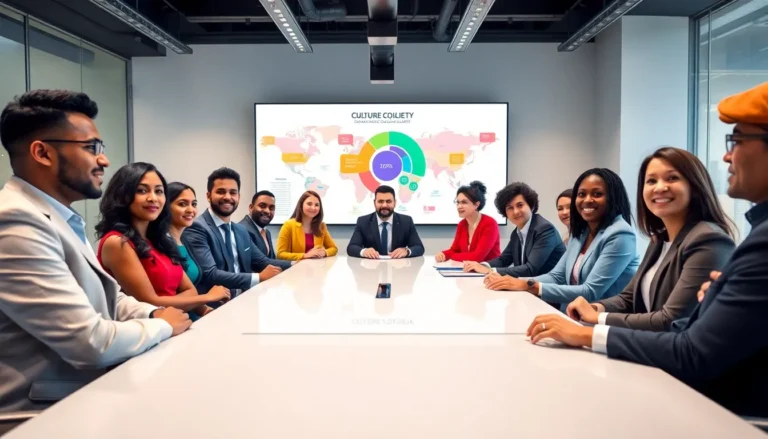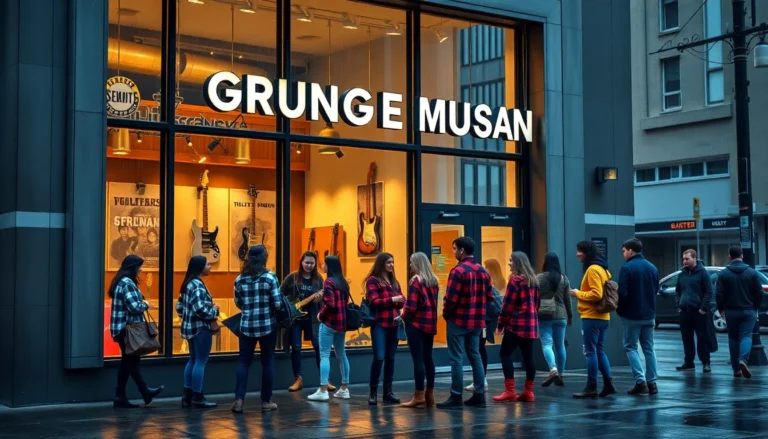In today’s whirlwind of memes, TikTok dances, and streaming shows, defining contemporary culture feels like trying to catch smoke with your bare hands. It’s ever-changing, often unpredictable, yet utterly fascinating. From fashion trends that change faster than you can say ‘Instagram,’ to unprecedented social movements, contemporary culture embodies the spirit of modern life. So, grab your favorite coffee, sit back, and let’s unravel the rich tapestry that is contemporary culture – I promise it will be more entertaining than your last Zoom meeting.
Table of Contents
ToggleDefining Contemporary Culture

Contemporary culture refers to the set of ideas, practices, and values that characterize today’s society. It is shaped by diverse influences and constantly evolves to reflect the world around it. This culture captures the essence of current social norms, artistic expressions, and technological advancements. It’s not just defined by trends in music or fashion: rather, it encompasses the collective consciousness of a generation that is continuously influenced by global events and local experiences. From the rise of social media to the increasing importance of sustainability, contemporary culture embodies the dynamic nature of human interaction in the 21st century.
Key Characteristics of Contemporary Culture
Contemporary culture embodies several key characteristics that set it apart from previous eras. Diversity is at the forefront. With globalization, cultures collide and intermingle, creating a rich tapestry of identities. Fluidity defines it too: trends come and go, making it difficult to pin down a static definition. Also, contemporary culture embraces individuality, encouraging self-expression through various platforms, primarily digital. Digital connectivity has cultivated a collective voice where people can share their opinions and experiences, drastically influencing societal norms. Finally, a growing emphasis on sustainability and social justice has reshaped cultural dialogues, urging society to consider the planet and marginalized groups in everyday decisions.
Influences on Contemporary Culture
Numerous influences shape the contours of contemporary culture. Globalization has allowed ideas to flow freely across borders. What might start as a trend in one part of the world quickly finds resonance elsewhere, thanks to platforms like Instagram and TikTok. Media representation plays a pivotal role too. When popular shows and films celebrate diverse stories, audiences respond, which further reinforces these narratives in society. Also, political movements impact cultural dynamics significantly. As the world engages more with activism, issues surrounding race, gender, and climate change seep into daily cultural expression, shaping public perceptions and actions. Essentially, contemporary culture derives its richness from a blend of historical legacies, current events, and technological advances.
The Role of Technology in Shaping Culture
Technology is the beating heart of contemporary culture. The internet has created a virtual marketplace for ideas, opinions, and creative expressions. The rise of social media platforms has revolutionized how cultures are shared and consumed. Now, anyone with a smartphone can influence trends, whether it’s a viral dance challenge or an impassioned plea for justice. Also, technologies like virtual reality and augmented reality are reshaping the very nature of art and interaction, allowing individuals to experience culture in immersive ways. Besides, the digital space has become a battleground for social movements, where hashtags can mobilize millions in mere moments. So, technology isn’t just a tool: it actively crafts narratives, frameworks, and identities of contemporary culture.
Art and Expression in Contemporary Society
Art in contemporary society goes beyond traditional canvas paintings and sculptures. It is often a reflection of societal issues, emotional experiences, and cultural dialogues. Artists leverage various mediums, from digital art to street installations, to express and provoke thoughts. The rise of socially engaged art exemplifies this dynamic: every brushstroke or pixel can communicate messages about race, gender, and the environment. Also, the accessibility of tools has democratized art-making, enabling more people to explore their creativity in ways previously restricted to institutions. From graffiti that comments on urban life to viral internet art that captures fleeting moments, contemporary art mirrors the complexities of society and invites collective engagement.
Challenges Facing Contemporary Culture
With its evolution come significant challenges. The rapid pace of change can sometimes lead to cultural appropriation, where aspects of one culture are borrowed by another, often without proper understanding or respect. Mental health issues have also become prevalent as individuals grapple with the pressures of social media and the constant comparison it breeds. Plus, the resurgence of polarization in society influences cultural conversations, creating divide rather than unity. Debates over political correctness and freedom of expression often leave individuals feeling stifled or anxious about sharing their views. These hurdles reflect the complexities inherent in the blending of diverse perspectives and the rapid evolution of contemporary culture.
The Future of Contemporary Culture
The future of contemporary culture promises to be as dynamic as its present. As technology continues to advance, art and culture will likely blend even more seamlessly. Imagine experiencing a concert through virtual reality or engaging with art through interactive narratives. Sustainability is set to be a cornerstone, guiding not only the way individuals express themselves but also how communities operate. The conversations we have today around inclusion and representation will shape the narratives of tomorrow. Also, as global crises, whether environmental, economic, or social, continue to unfold, culture will likely evolve to address these pressing issues, pushing humanity toward a more empathetic and aware existence.








